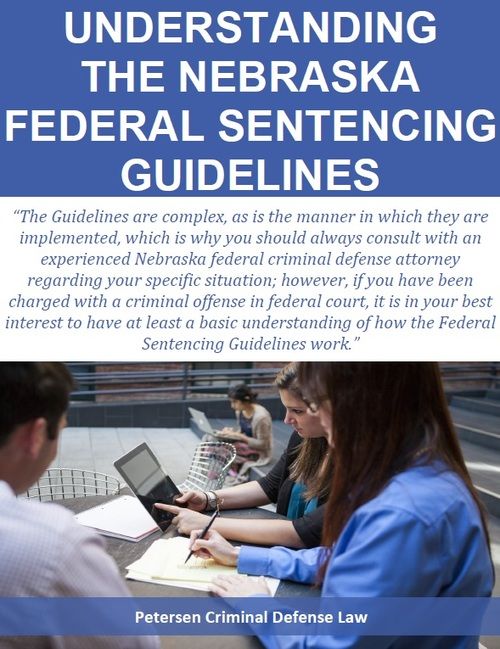
If you have been charged with a criminal offense, your primary concern will focus on preventing a conviction.
Sometimes, however, a conviction is inevitable. When this happens, your attention should shift to the sentencing aspect of the criminal prosecution.
If you have never been convicted of a crime before, you probably have several questions and concerns about the sentence you are likely to receive, the procedures for sentencing, and what happens after your sentence is determined.
To eliminate some of your anxiety and answer some of your questions, the Nebraska criminal attorneys at Petersen Criminal Defense Law created the following “How Sentencing Works” guidelines.
Keep in mind every case is unique. If you have specific questions or concerns about your particular situation, feel free to contact the office to schedule an appointment. We want to help you!
Paths to Sentencing
When learning how sentencing works and the sentencing process, you will learn that a criminal prosecution must be resolved in one of three ways:
- Dismissal of the charges against the defendant by the prosecuting attorney or judge,
- A guilty plea agreement negotiated by the defendant and the State, or
- Trial, which may result in an acquittal or a guilty verdict.
NOTE: Occasionally a jury cannot reach a verdict, known as a “hung jury.” In that case, the case remains unresolved and must be tried again unless resolved via dismissal or plea agreement.
Guilty Plea Agreement
Terms are negotiated by the defense attorney and prosecuting attorney. Usually, all terms are agreed upon by parties within the agreement
Sometimes, a term may be “open.” This means:
- An open term means the judge decides,
- An open term may have parameters (For example, the length of incarceration may be left for the judge to decide but will be no less than five years and no more than 15 years).
The agreement must be approved by the judge. Common reasons why a judge might reject a plea agreement include:
- The judge thinks the terms are too lenient,
- The judge thinks the terms are too harsh,
- The defendant cannot agree to a factual basis for the guilty plea, meaning the defendant does not clearly admit guilt, or
- The judge is not convinced the agreement was entered into “knowingly and voluntarily”
If the judge rejects the agreement, the case remains open and will proceed to trial if not resolved.
Trial Verdict
A trial may be held before a judge or jury. A judge or jury may find the defendant guilty of some charges and not guilty of other charges. After the verdict is announced, the case moves to the sentencing phase where the judge determines the sentence.
NOTE: If the case involves a capital crime, meaning a crime for which the death penalty may apply, the jury may be involved in sentencing to the extent that the jury decides if the circumstances necessary for the death penalty to apply were present.
What Happens at a Sentencing Hearing?
If the charges involved are minor crimes (usually misdemeanors), a judge may move directly from accepting a guilty plea agreement or the reading of a verdict at trial to sentencing. If the charges involved are more serious, a sentencing hearing is set.
A pre-sentence investigation may be ordered by the judge:
- Conducted by the probation department,
- Gathers information about the defendant’s family, educational, work, and criminal background,
- Used by the judge to determine the sentence.
At the hearing, both the defense and the State may present evidence, testimony, and argument in support of their position on sentencing.
What Is a Pre-Sentence Report?
If the judge is going to exercise discretion in your sentence, and sometimes even when the terms are already set by agreement, the court may order a pre-sentence investigation.
This is typically handled by the probation department and is intended to give the judge relevant information about your criminal background as well as your personal history and current situation.
After meeting with the person assigned to conduct your investigation, a pre-sentence report will be compiled and sent to the judge presiding over your sentencing.
The judge will review the report and use information contained therein to determine your sentence.
Sentencing Types and Terms
A judge has discretion when fashioning a sentence; however, there are guidelines.
A judge may order any of the following as part of a sentence:
- A period of incarceration in jail or prison,
- Fines,
- Restitution (to a victim),
- Probation,
- Community service, or
- Commitment to a drug/alcohol rehabilitation facility or a mental health facility.
Nebraska Sentencing Guidelines
Offenses in Nebraska fall into one of four categories:
- Infraction,
- Misdemeanor,
- Felony, or
- Capital crime.
Within the categories are sub-categories. For example, felonies are sub-divided into Class IA through Class IV felonies with a Class IV felony being the least serious.
Within each Class, the Guidelines provide a minimum and maximum sentence. A judge will usually sentence a defendant within the guidelines unless there is a justifiable reason for a departure.
If a mandatory sentence applies:
- The judge does not have the authority to deviate from the mandatory minimum but can sentence the defendant to more,
- The defendant must serve at least that much time in jail/prison,
- The defendant may serve more time.
Free Report: Nebraska Federal Sentencing Guidelines
In the United States we operate under a federalist system of government, meaning we have a strong central government along with numerous smaller governments in the form of state governments. As a result, an individual can be charged with a criminal offense at the state level, the federal level, or both. Because the U.S. Constitution is the ultimate authority for both the state and federal criminal justice systems there are significant similarities between the two systems; however, there are some differences as well.
One aspect of the federal system, for example, that is not found in all state systems is the use of sentencing guidelines. The Guidelines are complex, as is the manner in which they are implemented, which is why you should always consult with an experienced Nebraska federal criminal defense attorney regarding your specific situation; however, if you have been charged with a criminal offense in federal court, it is in your best interest to have at least a basic understanding of how the Federal Sentencing Guidelines work.
Click here to read the whole report or download the PDF.
Aggravating and Mitigating Factors
When deciding on a sentence, a judge will take aggravating and/or mitigating factors into account, if present.
Aggravating factors are factors that make the crime and/or the defendant worse than the average, such as:
- Previous convictions,
- The weapon involved in the commission of the crime,
- Injury to a victim during the commission of the crime,
- Lack of remorse.
Mitigating factors are factors that make the crime and/or defendant better than the average, such as:
- No criminal history,
- Mental health issues,
- Acceptance of responsibility,
- The defendant was a victim of abuse himself/herself.
Contact Our Nebraska Criminal Defense Attorney Today
If you have additional questions or concerns about the sentencing guidelines in the state of Nebraska, it is in your best interest to consult with an experienced criminal defense attorney.
In Nebraska contact Petersen Criminal Defense Law.

